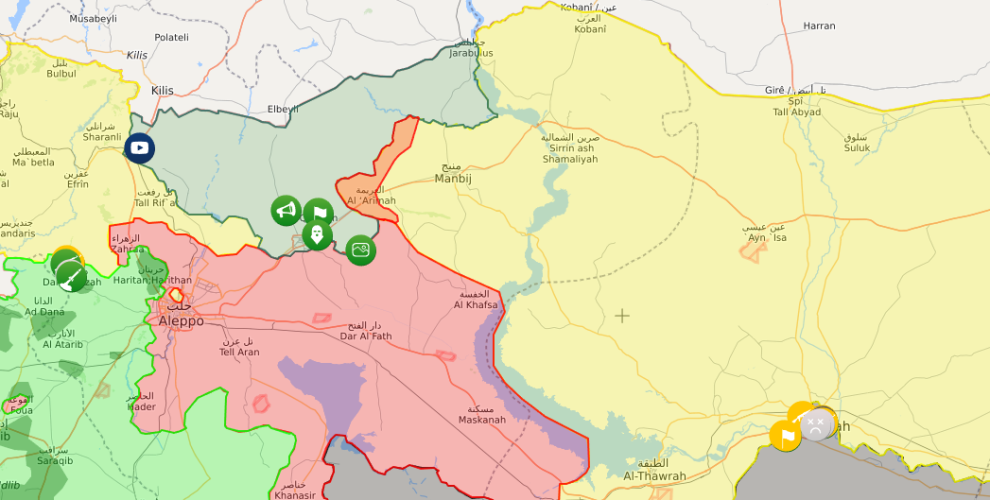What does Turkey want to do in Northern Syria?
Syrian Democratic Council (MSD) Co-chair Îlham Ehmed stated that Turkey wants to prevent the liberation of Raqqa and become permanent in the Shehba region.
Syrian Democratic Council (MSD) Co-chair Îlham Ehmed stated that Turkey wants to prevent the liberation of Raqqa and become permanent in the Shehba region.

Syrian Democratic Council Co-chair Îlham Ehmed wrote an article published in the Özgürlükçü Demokrasi newspaper titled “What is happening in Shehba?” and commented on Turkey’s plans in Shehba, Manbij and Raqqa, stressing that international powers are silent in the face of Turkey’s plans for invasion.
The article, translated by ANF English service, is below:
As the operation to liberate Raqqa continues successfully and the city is cleared of gangs street by street, an ethnic cleansing project is attempted in the Shehba region against Arabs and Kurds. Turkey and ISIS had extensive negotiations over two of the important towns of the region, al-Bab and Jarablus, and as the result of these, ISIS pulled out of these regions to hand them over to Turkey and their allied groups. Since then, the people there have been subjected to cultural and ethnic genocide in a systemmic fashion. Turkey is enacting the same invasion policies they used for Iskenderun in the past in Shehba today. Schools there teach in Turkish, and the children are taught Turkish history. Groups trained as police forces are trained with chants of loyalty to Erdoğan. The people of the region are exiled. Turkmens are brought in to be settled and people die every day. Sunni gangs who are trapped in other parts of Syria are positioned here. These are all done in line with the project to change the demographics of the region.
Forces in Syria are focused on their own projects now, so nobody asks “If these are liberated areas, why are there so many massacres?”, or “Why are people migrating en masse?”. The situation is tragic. Turkey’s practices in Shehba are ignored for the sake of their silence in the face of developments in the region. But how long can Turkey stay silent? They are presenting themselves as the biggest enemy of Iran and their Shia project to reach over to Raqqa, and they blame the Kurds of serving Iran’s Shia project.
They are marketing the al-Bab invasion to Iran and the Syrian regime on one hand, claiming that they did it to prevent the Kurdish corridor, and on the other hand they claim they did it to prevent the Shia project, for regional and international forces. Turkey is attempting to achieve consent from everybody, thus becoming permanent in the region.
Groups in Shehba are directly affiliated with the Turkish intelligence service MİT. They are carrying out whatever is necessary for the Turkish plan for invasion. They consider it an opportunity to Turkify these areas and exert similar pressure over Manbij. They want to disrupt the operation to liberate Raqqa with intensifying attacks. Because as Raqqa’s liberation will create great gains for the Syrian peoples, so will it be proof and a guarantee for humanity that an end to terrorism can happen. This fact disturbs the forces benefiting from ISIS that don’t want ISIS to be ended.
The Turkish state’s attacks and their policies in al-Bab, Jarablus and Azaz are reflections of this fear. The Turkish state is the main source of instability in the region, and it is using the region to void the struggle waged for the democratization of Syria.
The Turkish state’s policies in these areas are met with a serious silence from international human rights organizations, and Turkey and their allied groups are drawing strength from this silence. When human rights organizations don’t go out in the field and share the situation with the public, the Turkish state takes advantage of this and prepares numerous reports on allegations of “ethnic cleansing in Rojava”, thus hoping to cover up and mask the ethnic cleansing they are engaging in.
International human rights organizations definitely have to come to the region and investigate. They should uncover the truth of who is carrying out ethnic cleansing. This is also a moral responsibility for human rights organizations. Staying silent in the face of the massacres in Shehba will mean compliance with these massacres and this ethnic cleansing.
The UN has provided humanitarian aid to refugees only over the Baath regime up to date. And international organizations have done so over opposition groups. People not aligned with either of these groups have not received any humanitarian aid at all. This has been the approach of both states and international aid organizations. They are far removed from and not informed on the events in the region. It is time to stop the hypocritical and dishonest policies based on the annihilation of cultures and peoples. Standing against the ethnic cleansing in Shehba should be the first step for this.